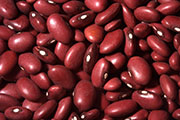- The Best Time of Day to Drink Bone Broth to Maximize Health Benefits
- 8 Ways to Increase Dopamine Naturally
- 7 Best Breads for Maintaining Stable Blood Sugar
- Gelatin vs. Collagen: Which is Best for Skin, Nails, and Joints?
- The Long-Term Effects of Daily Turmeric Supplements on Liver Health
- Could Your Grocery Store Meat Be Causing Recurring UTIs?
- Are You Making This Expensive Thermostat Error This Winter?
- Recognizing the Signs of Hypothyroidism
- 10 Strategies to Overcome Insomnia
- Could Artificial Sweeteners Be Aging the Brain Faster?
Beans, Lentils, Peas: Your Recipe for Lower Cholesterol?


Eating beans, lentils and other legumes may help you cut down on LDL “bad” cholesterol and lower your risk for heart disease, a new review suggests.
Canadian researchers examined 26 U.S. and Canadian studies that included a total of more than 1,000 people. Their analysis showed that one daily serving (3/4 cup) of legumes — foods such as beans, chickpeas, lentils and peas — was linked to a reduction in low-density lipoprotein (LDL) cholesterol by 5 percent. The study couldn’t confirm cause-and-effect, but did show a strong association.
The 5 percent reduction in LDL cholesterol suggests a potential 5 percent lower risk of heart disease, according to a team led by Dr. John Sievenpiper, of the Clinical Nutrition and Risk Factor Modification Center at St. Michael’s Hospital in Toronto.
The heart-healthy effect of legumes was greater in men than women, the research found. That may be because men tend to have worse eating habits and higher cholesterol levels to begin with than women, so they might gain more from switching to a healthier diet.
Some of the study participants reported stomach problems such as bloating, flatulence, constipation or diarrhea as a result of eating legumes.
Nevertheless, nutrition experts were quick to sing the praises of the lowly bean, pea and lentil.
“It’s time to spill the beans. By making a small dietary change, such as consuming one serving a day of beans, chickpeas, lentils and peas — as most of the world does already — we can make a modest risk reduction in our incidence of heart disease by lowering our ‘bad cholesterol’ LDL, especially in men,” said Dr. Robert Graham, an internist and natural remedy specialist at Lenox Hill Hospital in New York City.
He said the study analysis was “methodologically strong,” with people being followed for at least three weeks to test the effect of legume intake on health. According to Graham, that three-week threshold is the same the U.S. Food and Drug Administration uses when it evaluates any product that claims to help lower cholesterol.
Angelo White is a sports dietitian and assistant clinical professor at Quinnipiac University in Hamden, Conn. He called legumes “one of the most underappreciated sources of protein out there. They are loaded with hunger-fighting fiber and protein, so I am not surprised to see the results of this study.”
But White added that, “the tricky part is getting Americans to eat more. I suggest foods like hummus, lentil soup in the slow cooker, and adding beans to pasta dishes, soups, salads and quesadillas to work more into the daily diet.”
The study was published April 7 in CMAJ, the Canadian Medical Association Journal.
More information
The American Heart Association has more about cholesterol.
Source: HealthDay
Copyright © 2026 HealthDay. All rights reserved.










